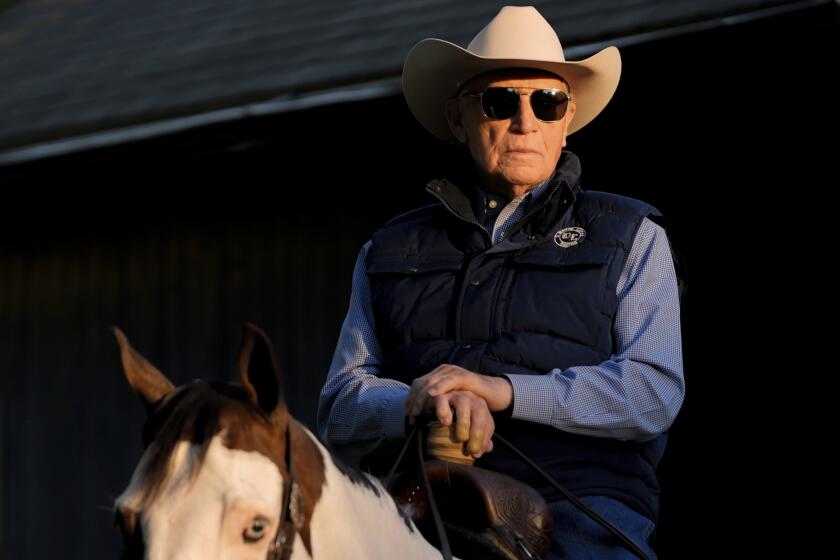THUMBS UP : Garvey Isn’t Bitter About Unorthodox Play at Home Plate That Ended His Streak at 1,207 Games
- Share via
Steve Garvey, the former Dodger and San Diego first baseman, will always remember June 30, 1983.
That’s the day his streak of playing in 1,207 consecutive games ended.
Garvey’s streak was surpassed by shortstop Cal Ripken of the Baltimore Orioles, who extended his streak to 1,208 consecutive games, third-longest in major league history, Thursday night against the Toronto Blue Jays. Only Lou Gehrig, with 2,130, and Everett Scott, with 1,307, played more consecutive games.
Garvey’s streak was ended by an injury in the first game of a doubleheader. Playing with the Padres, he suffered torn ligaments in his left thumb in a collision with Atlanta Brave pitcher Pascual Perez on a play at the plate.
“Pascual Perez was straddling home plate, like they don’t teach pitchers to do--but Pascual has done a lot of things they don’t teach pitchers to do,” Garvey said. “And I had to decide whether to slide straight in and buckle his leg, or to go around. I tried to go around and as I was sliding, I caught his heel and it pulled my thumb back.”
Although Garvey knew that he was seriously injured, he was determined to preserve his streak.
“I knew that it was dislocated and I put my thumb back in the socket and I said to myself that maybe I could put ice on it and tape it and pinch-hit in the second game of the doubleheader,” Garvey said. “But I took my right hand off my left thumb and the thumb just fell down because it had no support. I knew that I was in trouble.”
Garvey underwent surgery the next day and missed the rest of the season.
He recalls the streak fondly, though.
“After you get over 1,000 games, the streak becomes something special, and people know that you’re not doing it because you get paid extra. You do it because you love the game and have a personal commitment.
“It’s just like school. I never wanted to miss a day of school and I never wanted to miss a game. The couple of times that I didn’t start games and was going to pinch-hit later, it drove me crazy. I was antsy and couldn’t sit down in the dugout.
“I probably used more energy on the bench than I did playing. I told (Dodger Managers) Walter Alston and Tommy Lasorda just to get me out there so they wouldn’t have to deal with me.”
Garvey played through an assortment of injuries--pulled hamstrings, hyperextended knees and migraine headaches--in order to maintain his streak.
Would he do it over again?
“No way,” Garvey said. “I was too lucky. I wouldn’t chance it again.”
Ripken, too, has avoided serious injury during his streak, which began on May 30, 1982. He suffered a sprained ankle in the second game of the 1984 season, but it didn’t sideline him.
“It was a Wednesday afternoon game, I can remember that very clearly,” Ripken told the Associated Press. “The next day was an off-day, and we were going to play the Naval Academy, and the next game wasn’t until Friday night.”
By then, Ripken was able to keep his streak alive.
Garvey said Ripken’s streak is extraordinary.
“Only a couple of us know what it’s like to play this long,” Garvey said. “I’ve always felt it was an honor. God blessed me with a strong body and mind that I was able to go that long and avoid serious injury and be able to play day in and day out to justify starting.”
Ripken is also proud of his streak.
“Looking at it, I’m proud of the fact that I’ve done it, not because of the number of games but because I can be counted on to play on a daily basis,” he said.
“Each of us is supposed to do an individual job, but at the same time each of us is counting on others to do their jobs. If you can’t pull your weight . . . I think I’ll be smart enough not to do that.”
Oriole Manager Frank Robinson plans to keep Ripken in the lineup.
“I’m not going to take him out of the lineup,” he told reporters. “I don’t concern myself with the streak, but I’m not going to take him out of the lineup.”
Ripken, 28, could pass Gehrig in 1995.
Is Gehrig’s record within reach of Ripken?
Garvey said it isn’t.
“I don’t think (Ripken can pass Gehrig) but I can’t say no,” Garvey said. “Ripken plays a physically demanding position. There’s more chance to get banged up playing shortstop.”
Gehrig and Garvey were first basemen. Is that significant?
“I don’t think so,” Garvey said. “You can get hurt playing first base, too. I don’t think it’s anything more than three guys who had good endurance and were lucky.”
Make that four guys who had good endurance and were lucky.
More to Read
Go beyond the scoreboard
Get the latest on L.A.'s teams in the daily Sports Report newsletter.
You may occasionally receive promotional content from the Los Angeles Times.










